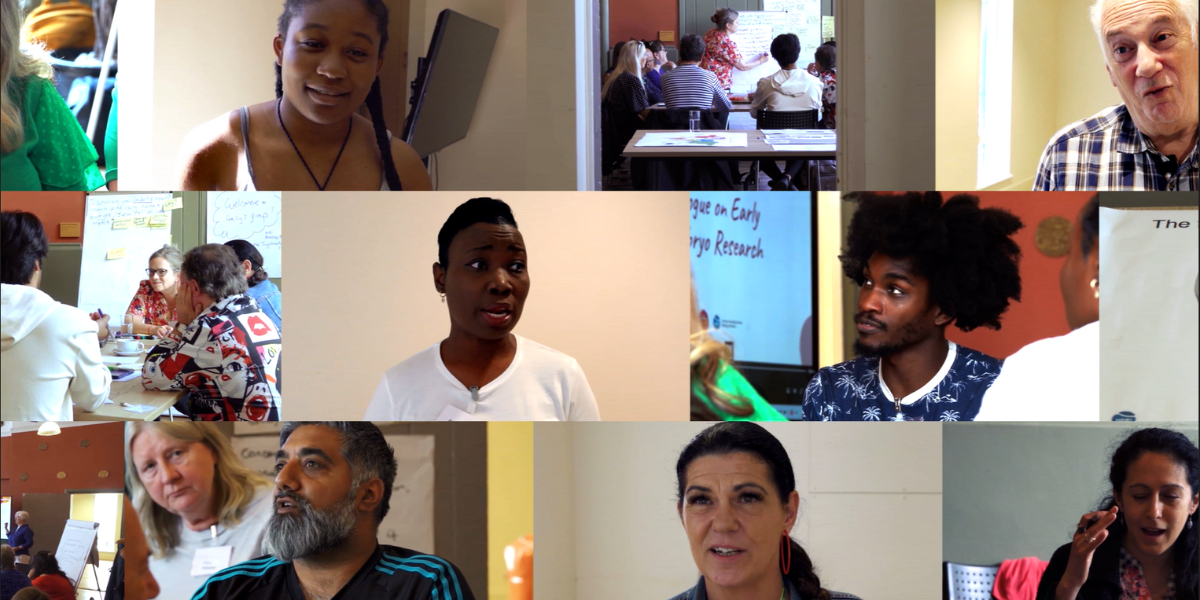Listening and learning – a scientist’s experience of participating in a public dialogue

When I heard that the Human Developmental Biology Initiative (HDBI) had commissioned a public dialogue on human embryo research, I knew immediately that it was something that I wanted to be part of. I’ve been interested in developmental biology since studying my undergraduate degree, and now that I’ve started my PhD actually researching early human embryo development, I was curious to see how today’s society viewed my area of research. I was also curious to see what people thought about the use of stem-cell based embryo models, which are an important tool in my research.
Now is a pivotal time in the field with rapid advancements in technology leading to a review into the way this research is regulated in the UK. I believe that it’s important that consultations around this are done in a meaningful way so that the scientific community can continue to make rapid progress informed by society’s expectations of ethical research. The HDBI public dialogue, conducted by Hopkins Van Mil, was designed to do just that.
What was the public dialogue?
Seventy members of the public representative of the UK population took part in over 15 hours of activities to allow them to explore their own views on embryo research. This is different from other forms of public engagement because it goes beyond just informing people about the science; it also aims to get back the public’s perspectives on the science.
So, I put my name down to be involved, but what next? I was assigned to two iterations of the dialogue: first a group consisting of participants who have experience of fertility treatment or developmental conditions, and second a group representative of the general UK population based in the North of the UK (for ease of attending in-person workshops; a similar group was held for the South). Through a mix of online and in-person workshops, the participants heard short presentations and interviews covering the science, the regulations, and also a wide range of ethical viewpoints. These provided the stimulus for extended small-group discussions facilitated by the team from Hopkins Van Mil, which gave the participants an opportunity to digest what they had heard and formulate their own opinions. My role, as a PhD student working on human embryo development and stem cell models, was to be on standby with other scientists, regulators, and ethicists to answer any specific questions. Then, during the panel discussions we fed back our reflections to the participants.
Before going in to the first workshop, I was a little apprehensive and unsure of what to expect. I was very worried about saying the “wrong” thing because this is such a sensitive topic. While this was in the back of my mind all the way through, seeing how interested the participants were to hear what we had to say, as well as the deep respect they had for every single person’s views, gave me more confidence.
Actually, the biggest part of my role in the dialogue was simply to listen to the participants’ discussions. I say simply, but really this was one of the key aspects of this being a dialogue. It wasn’t about lecturing the participants; it was about having a two-way conversation. The discussions were honest and open, allowing everyone to voice their opinions from across the spectrum, and explore different misconceptions and myths alongside the excitement for the future of the field. By engaging in discussions in this way, I felt the participants were able to understand that scientists care about and respect the work we do with embryos. On a personal level, it also allowed me the space and time to properly reflect on what I was hearing.
What did I learn?
One thing that I heard loud and clear from the participants was that they really wanted scientists to communicate with them more. Many said they had never heard about human embryo research before, but that they had now become invested in learning more about it. Some also said they would appreciate engaging with scientists throughout the entire research cycle – not just when a breakthrough has been made or something was about to change, but also in the early planning stages and during the project – as a good way of checking that work remains in line with society’s values.
Something that surprised me was how widely the participants were thinking about human embryo research. They were generally less concerned about the details of the research itself, but the implications of the outcomes and how they would fit into society – would people have equal access to new treatments? Is the condition something society even wants a treatment for? Does someone stand to make a big profit from the research? While I know these implications are set out in a lot of researcher’s grant applications, as a fundamental science researcher on the day-to-day, these things seem quite far removed from my lab bench and pipettes. But stepping out of the lab and being able to hear perspectives from people outside of academia, and who therefore bring their own unique experiences to the topic, made me realise that it’s really important to consider that all science happens within the context of wider society.
Going forward from my first experience of a major public engagement project, I hope to take more opportunities to participate in similar projects to keep the conversation going. And I will try to step out of my “lab-mindset” every now and then to see my work in a much bigger picture.
Read Dr Michael Norman's summary
We need more public dialogue around fundamental research